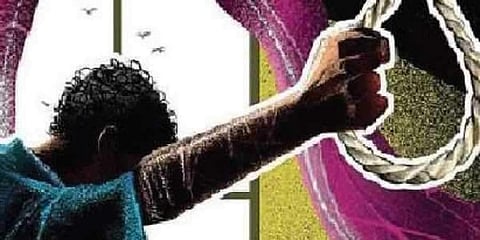

“Suicide is an emerging and serious public health issue in India but preventable with timely, evidence-based and often low-cost interventions. The most vulnerable and affected age group is between 15 and 29 years,” states the World Health Organisation (WHO). Subsequent studies done in the country and overseas have indicated the alarming increase in suicide cases in India.
A recent study, ‘The Global Burden of Diseases’, published earlier this year states that people in the age bracket of 18 and 29 years of age in India have the highest rate of suicide, Dr Senthil Reddy, Additional Professor, Psychiatry, NIMHANS, told TNIE. India has the largest population of young people (below the age of 25) in the world.
“It’s a matter of grave concern that we are losing our young generation to suicide in their best productive years. Suicide has overtaken other major causes of death such as road accidents for men and maternal mortality for women. Globally one of every four deaths among men and one out of every three deaths among women is from India,” said the psychiatrist.
A first-ever National Mental Health Survey (NMHS), which was conducted in 2016 by the National Institute of Mental Health & Neuro Sciences (NIMHANS) in collaboration with 15 other institutions on behalf of the central government, had for the first time thrown up shocking revelations on the prevalence of mental health issues and growing instances of suicide in the country. Based on the NMHS, which was conducted in 12 states covering a random sample population of 40,000 people, the researchers had stated that nearly 1% of the population in the country (70 lakh to 1 crore people) suffered from reported “high suicidal risk”.
“NMHS had suggested that for every one person who had committed suicide, there were at least 15 people who at some point of their lives had attempted suicide, and 200 others who had harboured thoughts of suicide,” said NIMHANS Director BN Gangadhar. “Among the vulnerable population, 30% were at risk of committing suicide due to co-occurring mental illness, while the rest did not report any co-morbid mental disorder and were at high risk because of reasons such as failure in relationships, academics, finances and complication in their personality,” he said.
‘Suicide prevention strategy proposed’
“More women were found to harbour thoughts of suicide but the incidence of suicide was found to be higher among men in the country,” said NIMHANS Director BN Gangadhar.“The NMHS data is extremely worrying. One per cent of the 40,000 people who were screened, had reported a high level of suicidal thinking in the preceding one month. The numbers translated to 70 lakh to 1 crore people in the country, given the fact that the study was undertaken as representative of the entire population. The survey had also found that 6-7 crore people had experienced moderate to severe levels of suicidal thoughts,” said Dr Reddy.
“A National Suicide Prevention Strategy has been proposed and is being reviewed by the government of India to understand various approaches to address this problem,” he added. Nimhans has been collaborating with various stakeholders and district mental health authorities and programmes to build a resource and skill-based community across the country. Suicide is preventable.
“One can overcome the thought of ending one’s life by seeking help from someone they can confide in. Most people who are suicidal are often looking for help,” added the psychiatrist.
TRAINING GATEKEEPERS
The Gatekeepers Training programme, conducted by Nimhans, has trained thousands of volunteers, who have formed support groups which provide timely help to vulnerable people in their immediate surroundings – workplace, neighbourhood and academic institutions. “Look out for early signs of suicide in people and help them come back to life. Give them a listening ear,” said
Dr Senthil Reddy.
WHO GLOBAL THEME
Alarmed at the global figures of at least 8 lakh people committing suicide annually, WHO has themed this year’s World Mental Health Day on ‘Prevention of Suicide’.
